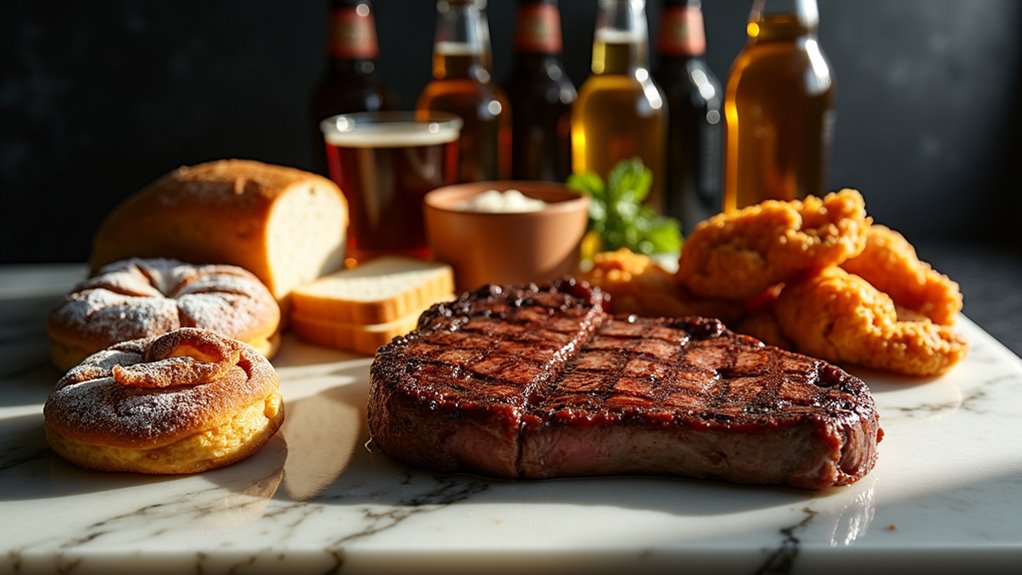When managing osteoarthritis through diet, you’ll want to focus on anti-inflammatory foods like fatty fish, nuts, berries, and leafy greens rich in omega-3s and antioxidants. It’s vital to avoid inflammatory triggers such as processed foods, refined sugars, saturated fats, and excessive dairy products. Pairing these dietary changes with proper nutrient timing and portion control can help reduce joint pain and inflammation. Understanding the complete nutritional approach will bolster your osteoarthritis management strategy.
Understanding the Link Between Diet and Osteoarthritis

While the development of osteoarthritis primarily stems from joint wear and tear, emerging research demonstrates that dietary choices profoundly influence inflammation levels and disease progression. Your food selections can either amplify or reduce inflammatory responses throughout your body, directly impacting joint health and symptom severity.
Research supports following an anti-inflammatory diet, such as the Mediterranean diet, which emphasizes omega-3 fatty acids while limiting processed foods and saturated fats. You’ll benefit from increasing your intake of fruits and vegetables, which contain natural compounds that help combat inflammation. If you’re carrying extra weight, adopting these dietary changes can support weight loss, reducing pressure on your joints. While some people report sensitivity to nightshade vegetables, there’s limited scientific evidence supporting widespread elimination. Instead, focus on establishing a comprehensive, balanced, anti-inflammatory eating pattern.
Anti-Inflammatory Foods That Help Manage Joint Pain

Since managing osteoarthritis requires an all-encompassing approach, incorporating specific anti-inflammatory foods into your diet can considerably reduce joint pain and slow disease progression. Your nutrition strategy should focus on foods rich in omega-3 fatty acids, monounsaturated fats, and antioxidants.
Food Type | Anti-inflammatory Benefits
—|—
Oily Fish | High in omega-3 fatty acids that reduce inflammation
Nuts | Contains monounsaturated fats that protect joints
Garlic & Onions | Provides compounds that preserve cartilage
Produce | Berries and leafy greens offer antioxidant protection
You’ll want to prioritize consuming beans for their fiber content, which helps lower inflammation markers. When combined with oily fish like salmon and mackerel, plus nuts such as walnuts and almonds, you’re creating a powerful dietary defense against osteoarthritis symptoms. These foods work synergistically to combat inflammation and support joint health.
Harmful Foods That Can Worsen Symptoms

A thorough understanding of inflammatory triggers is essential for managing osteoarthritis effectively. You’ll want to avoid foods high in saturated fats, such as fried foods and red meat, as they can accelerate joint damage and increase inflammation. Processed sugars found in candies and sodas trigger inflammatory cytokines, while refined carbohydrates like white bread and pasta cause blood sugar spikes that worsen symptoms.
Be cautious with dairy products, as they may irritate joint tissue and promote inflammation in some individuals. Furthermore, alcohol and tobacco use can heighten oxidative stress in your body, potentially aggravating your condition. By identifying and eliminating these harmful foods from your diet, you’re taking a proactive step in managing your osteoarthritis symptoms and safeguarding your joint health.
Essential Nutrients for Joint Health and Protection
To maintain healthy joints and protect against osteoarthritis progression, your body needs specific nutrients that support cartilage integrity and reduce inflammation. You’ll find omega-3 fatty acids in oily fish, which help protect your cartilage and combat inflammation associated with osteoarthritis.
Vitamin D isn’t just pivotal for bone health it’s essential for maintaining healthy cartilage and can improve your muscle strength when you’re managing osteoarthritis. You’ll also want to guarantee adequate vitamin K intake, as it plays a critical role in cartilage and bone formation. Don’t overlook dietary fiber‘s importance; it offers anti-inflammatory benefits and supports gut health, which directly impacts your joint health. While you’re focusing on these essential nutrients, it’s best to skip supplements like glucosamine and chondroitin, as there’s insufficient evidence supporting their effectiveness in treating osteoarthritis.
Building a Balanced Meal Plan for Osteoarthritis Management
Building an effective meal plan for osteoarthritis management requires strategic food combinations that optimize nutrient absorption and anti-inflammatory benefits. You’ll want to structure your meals around omega-3 rich foods like salmon and mackerel, pairing them with olive oil and polyunsaturated fats for amplified absorption. Incorporate plenty of fruits and veggies high in vitamin C and vitamin E, such as blueberries and leafy greens, alongside whole grains to maintain a balanced diet.
To augment vitamin D absorption, combine dairy products with fatty fish, and guarantee you’re including a variety of antioxidant-rich foods throughout the day. Focus on weight management by controlling portion sizes and avoiding inflammatory processed foods. This approach helps create a sustainable eating pattern that supports joint health while delivering essential nutrients your body needs.
Frequently Asked Questions
Which Foods Make Osteoarthritis Worse?
You’ll want to avoid several foods that can trigger inflammation and worsen your osteoarthritis symptoms. These include refined carbohydrates, highly processed foods, and high-fat dairy products. Steer clear of fried foods, sugary beverages, and nightshade vegetables, which may increase joint pain. Furthermore, limit your consumption of red meat, gluten-containing grains, and foods high in saturated fats. It’s also crucial to reduce alcohol consumption, as it can intensify inflammation.
What Are 5 Worst Foods for Arthritis?
You’ll want to avoid these five foods that can worsen your arthritis symptoms: Initially, refined carbohydrates like white bread and pastries that spike inflammation. Second, processed meats and red meat containing high levels of AGEs. Third, sugar-sweetened beverages and sodas that trigger inflammatory responses. Fourth, fried foods that increase oxidative stress in your joints. Ultimately, high-fat dairy products that may irritate joint tissue and promote inflammation.
What Is the #1 Most Inflammatory Food?
While several foods can trigger inflammation, processed meats are widely considered the #1 most inflammatory food you’ll encounter. They’re packed with advanced glycation end products (AGEs), nitrites, and saturated fats that trigger inflammatory responses in your body. Research shows that processed meats, like hot dogs, bacon, and deli meats, can increase inflammatory markers more noticeably than other inflammatory foods such as refined carbohydrates, trans fats, or sugar-sweetened beverages.
What Aggravates Osteoarthritis?
Your osteoarthritis can be aggravated by several factors. Joint overloading and obesity put excessive stress on weight-bearing joints, while muscle weakness compromises joint stability. You’ll find that repetitive motions and previous joint injuries accelerate cartilage deterioration. Seniority-related cartilage loss naturally progresses over time, and joint immobility or misalignment can worsen symptoms. Don’t overlook genetic factors and metabolic disorders, as they’re significant contributors to osteoarthritis development and progression.





